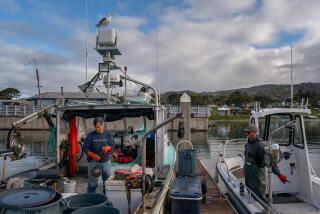U.S., Canada Reach Accord on Salmon
- Share via
The U.S. and Canada announced an agreement on salmon fishing in the Pacific, in a pact designed to end a decades-long dispute over harvesting of the fish. At the heart of the accord is the establishment of a new regime for setting quotas under the 1985 Pacific Salmon Treaty that is flexible, basing it on how abundant the fish are each year rather than fixed annual limits. The new quota system, first used several years ago by Alaska over the strenuous objections of Canadian and tribal interests, is designed to respond to often large fluctuations in runs of the five species of salmon in the North Pacific. The new regime, in force for 10 to 12 years depending on the fishery, will allow larger harvests in years of abundance and smaller ones in lean years, but overall it is likely to reduce the catch by between 5% and 50% in some stocks. The accord is expected to reduce the U.S. share of the salmon harvest to 16.5% from an average of 20.5%. A second critical component is the establishment of two funds, to be administered jointly by both countries, that would be used to assist in the recovery of threatened salmon stocks and in improving fisheries management. The agreement goes into effect immediately.
More to Read
Sign up for Essential California
The most important California stories and recommendations in your inbox every morning.
You may occasionally receive promotional content from the Los Angeles Times.













